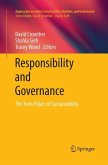Corporate Social Irresponsibility focuses on ethical failures in order to relate corporate responsibility to business ethics, corporate governance, and organization effectiveness. The book advocates a strategic approach to CSR - ethical management cannot, and should not, be divorced from effective management. Corporate social responsibility has transitioned from oxymoron into a defining challenge of the twenty first century. Taking the recent financial crisis as a starting point, Alexander examines the underlying ethical and legal crises these events expose in the business world. The problems that have come to light go beyond issues of firm financial performance into the integrity of the manufacturing and marketing processes, and relations with consumers. As such, the book presents a model that resolves the apparent conflict between maximizing shareholder value, and meeting the interests of other firm stakeholders. Alexander presents a balanced view, contrasting her model with alternative approaches. The book also covers the impact of globalization on management, the ethics of outsourcing, the limits of regulation, as well as poverty alleviation and social entrepreneurship. Blending a comprehensive theoretical framework with a broad range of cases, this book covers the latest major changes in US legislation, as well as recent corporate scandals making it a valuable accompaniment to any course in CSR, business ethics, or business, government and society.
Hinweis: Dieser Artikel kann nur an eine deutsche Lieferadresse ausgeliefert werden.
Hinweis: Dieser Artikel kann nur an eine deutsche Lieferadresse ausgeliefert werden.
"Companies demonstrate their commitment to corporate social responsibility (CSR) through their willingness to permit the global community to hold them accountable for the manner in which they interact with the ecological and social environments in which they operate. CSR is not an oxymoron, as numerous managers and business students believe, but rather demonstrates a company's commitment to effective management. CSR has much broader implications for management than simply a firmâEUR(TM)s financial performance, as it includes the integrity of organizational processes as well as the firm's relations with the global marketplace. As Alexander (Seton Hall Univ.) shows, many shortsighted corporate managers have failed to govern their firms and apply corporate responsibility to business ethics, corporate governance, and organization effectiveness. Alexander clearly and convincingly examines and lays out a balanced view of how managers can maximize shareholder value as well as meet the legitimate interests and demands of global contingencies. Numerous recent and relevant case studies legitimate Alexander's comprehensive theoretical framework. This book will complement courses in business ethics, corporate governance, business and society, and CSR. Summing Up: Highly recommended. Upper-division undergraduates and above." --J. P. Miller, emeritus, Retired from Simmons College, Boston, in CHOICE July 2015
"Corporate Social Irresponsibility is a long-overdue recognition of the importance of conducting ethical business in a modern world. It highlights the excesses when corporate leaders think maximizing shareholder value in the short-term trumps the interests of employees and society as a whole. This book uses recent abuses and the current status of ethical thinking and legal regulation to show how companies can balance the interests of owners, regulators, and other stakeholders. It shows us that ethical management is good management for everyone."-Jack Hampton Professor of Business at St. Peter's University, USA
"There is no more important economic issue than the responsibility of the business community for the common good. I heartily recommend Paula Alexander's textbook, Corporate Social Irresponsibility, for training future business leaders to understand the various meanings of the word "profit" and how failure to understand can be massively detrimental to the standard of living of so many people."-Msgr. Richard M. Liddy, Ph.D,University Professor, Seton Hall University , USA
"During my career I have had the opportunity to work in large financial brokerage institutions, operate an investment management company, and teach in academia. I have seen first hand, the deleterious effects of corporate irresponsibility. In Corporate Social Irresponsibility, Professor Paula Alexander, successfully lays out what did and can go wrong in public corporations as a tool to teaching students and professionals how to conduct themselves in the future in order to avoid the mistakes of the past."- Scott R Rothbort, President & Founder, LakeView Asset Management, LLC, Professor, Department of Finance, Stillman School of Business, Seton Hall University, USA
"Corporate Social Irresponsibility is a long-overdue recognition of the importance of conducting ethical business in a modern world. It highlights the excesses when corporate leaders think maximizing shareholder value in the short-term trumps the interests of employees and society as a whole. This book uses recent abuses and the current status of ethical thinking and legal regulation to show how companies can balance the interests of owners, regulators, and other stakeholders. It shows us that ethical management is good management for everyone."-Jack Hampton Professor of Business at St. Peter's University, USA
"There is no more important economic issue than the responsibility of the business community for the common good. I heartily recommend Paula Alexander's textbook, Corporate Social Irresponsibility, for training future business leaders to understand the various meanings of the word "profit" and how failure to understand can be massively detrimental to the standard of living of so many people."-Msgr. Richard M. Liddy, Ph.D,University Professor, Seton Hall University , USA
"During my career I have had the opportunity to work in large financial brokerage institutions, operate an investment management company, and teach in academia. I have seen first hand, the deleterious effects of corporate irresponsibility. In Corporate Social Irresponsibility, Professor Paula Alexander, successfully lays out what did and can go wrong in public corporations as a tool to teaching students and professionals how to conduct themselves in the future in order to avoid the mistakes of the past."- Scott R Rothbort, President & Founder, LakeView Asset Management, LLC, Professor, Department of Finance, Stillman School of Business, Seton Hall University, USA








